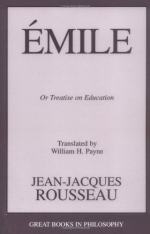
|
| Name: _________________________ | Period: ___________________ |
This test consists of 15 multiple choice questions and 5 short answer questions.
Multiple Choice Questions
1. What kind of opinions does Rousseau seem to hold, as he talks about book learning?
(a) Reverential.
(b) Skeptical.
(c) Devotional.
(d) Anti-intellectual.
2. What does the field of epistemology concern itself with?
(a) How we know what we know.
(b) The ideal forms behind the reality we experience.
(c) The realities behind the appearances we can see and measure.
(d) The study of correspondence.
3. What does Rousseau say Emile can say at the end of each day?
(a) I am stronger.
(b) I am less afraid.
(c) I have more.
(d) I know more.
4. What is it that allows an adolescent to exceed his limits?
(a) A strength he assumes by strict physical training.
(b) A strength he attains as the reward for competition against his peers.
(c) A strength that he did not know he had.
(d) A strength that had always been there, unused.
5. What does Rousseau say about selfishness?
(a) That it is the last stage of a man's growth.
(b) That it is a stage everyone passes through.
(c) That it is healthy and natural.
(d) That it is a beast.
6. What innate ability allows a child to exceed his limits?
(a) The ability to read.
(b) The ability to take responsible actions.
(c) The ability to discern right from wrong.
(d) The ability to learn from experience.
7. Where does Rousseau say self-love is rooted?
(a) In excessive desire.
(b) In self-awareness and natural affection.
(c) In stifling education.
(d) In fear of the world.
8. Whom does Rousseau address in Chapter 1, Book 3?
(a) Infants.
(b) Children.
(c) Mothers.
(d) Adolescents.
9. What was the official perception of "Emile"?
(a) Rousseau was challenging common sense.
(b) Rousseau was committing treason.
(c) Rousseau was encouraging readers to break the law.
(d) Rousseau was being disobedient to the rulers of France.
10. Against what does Rousseau warn teachers?
(a) Simplifying the truth.
(b) Giving students too much freedom.
(c) Dishonesty with their students.
(d) Consorting with their students.
11. What kind of clothing does Rousseau prefer for children?
(a) Loose-fitting.
(b) Greek tunics.
(c) Roman robes.
(d) Clothing reinforced with whalebone.
12. What is most relevant in deciding how or whether to punish a child?
(a) The temperaments of the parent and the child.
(b) The circumstances and the context of the infraction.
(c) The rule or law at issue.
(d) The spiritual dangers of the issue.
13. What kind of approach does Rousseau advocate for parents when their children are hurt?
(a) Punitive approach: punish the child for getting hurt.
(b) Hands-off approach: let the child fend for himself.
(c) Drastic approach: take the child to a doctor immediately.
(d) Moderate approach: let the child see that he will be all right.
14. What advice does Rousseau give to mothers?
(a) Never let the children outside.
(b) Rear their children near their schools.
(c) Hire a nanny for the child.
(d) Rear their children in the country.
15. What does Rousseau say is the danger of books?
(a) That they do not all use the same meanings for words.
(b) That they require one to read yet more books.
(c) That they will not educate the spirit.
(d) That they will lead to false belief.
Short Answer Questions
1. What advantage does physical activity confer on a student?
2. What does Rousseau say a man should have learned in his first 25 years?
3. What trade did Rousseau apprentice in?
4. What does Rousseau say he wants Emile to learn?
5. With what tone does Rousseau open Book 4 Chapter 1?
|
This section contains 570 words (approx. 2 pages at 300 words per page) |

|




